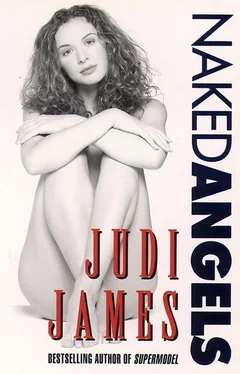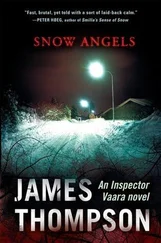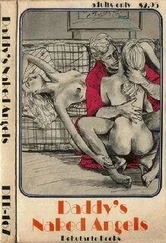Miss Clayburg smiled. She had crooked teeth but they were white, like the driftwood.
‘It was no kindness, Evangeline,’ she said. ‘When I received your grandmother’s letter and read who your father was I felt honoured to have been asked at all. I was Darius Klippel’s greatest devotee. If he has passed on half his talent you will be a very special little girl indeed.’
Grandma Klippel had more in store. ‘Close your eyes,’ she told Evangeline.
Evangeline closed her eyes and felt herself being led inside the house. They laughed as they took her up the stairs, counting each step out loud and warning her to take care on the last one. Then they went up again and again, towards the attic.
Evangeline had never been to the top of the house before, Grandma Klippel always kept those doors locked. She could hear the key turning now and then she felt the sun on her face and a greasy smell of oil in her nostrils.
‘Open!’ Grandma Klippel exclaimed.
The sun was dazzling, blinding. Evangeline squinted, trying to make out the shapes in the room. Miss Clayburg took her by the arms and turned her about slowly. They were in an artist’s studio, much like the room Darius had worked in at home, only bigger. The light came from the roof, which was all windows, and the smell came from the tubes of paint, which were lined up in their hundreds, ready for use. There were canvases and easels and several unfinished paintings of Darius’s, piled up along the walls.
Grandma Klippel clapped her hands together.
‘Well, Evangeline?’
Evangeline had stopped breathing. The smell of the oil paints was like a knife cutting into her soul. Every time she breathed in she was back in the studio in Boston and Darius was fooling around and making her laugh.
Sometimes he put paint on his face. Or he would do lightning scribbles with charcoal and draw funny pictures of Lincoln with his eyes crossed. Once he let Patrick loose with a paintbrush between his teeth and framed the result. Her mother used to joke it was the best work of art in the house.
Not breathing was difficult but she didn’t want to know that smell any more, it hurt too much. ‘What do you think, dear?’
It wasn’t Grandma Klippel’s fault, she wasn’t to know. She was looking happier than Evangeline had ever seen her. Miss Clayburg looked as though she was in the throes of ecstasy.
Evangeline smiled. ‘It’s an artist’s studio,’ she said.
‘It was Darius’s studio, dear, when he was at home,’ her grandmother told her. Her eyes looked pale and filmy with excitement and memories. ‘Now you are to use it.’
‘But I don’t paint.’ It seemed like a simple truth.
Grandma Klippel was busy looking round. ‘We’ll see, we’ll see,’ she whispered. ‘I know you have the flair, Evangeline. Look at the driftwood you bring home, just like my son did when he was your age. He used to spend hours gazing at the shapes. You have an eye for beauty and that is an important start. Miss Clayburg can teach you the rest.
‘Knowing that this place will be used again has made me happier than I can imagine.’ She was speaking to Miss Clayburg now, above Evangeline’s head.
Miss Clayburg must have seen her expression, though, because she smiled down at her.
‘Don’t worry, Evangeline,’ she said, ‘we’ll treat it as a game at first – just have some fun messing around with all the colours and things. Look,’ she took Evangeline across to a table covered with paintboxes, ‘did you ever see a rainbow? Yes? Maybe we could create one on this sheet of paper here, using these colours. Do you remember how it looked? Draw the shape.’ She pressed a pencil into Evangeline’s hands.
Evangeline reached across the vast expanse of white paper. It was important to do well. It was important not to make a mistake. She had to be good. She had to be careful. People were watching. Live people. Dead people. She leant across and slowly drew a neat but teeny arch in the middle of all the white, being more careful than she had ever been before in her life. Miss Clayburg’s smile became a little more squeezed.
‘Good,’ she said, ‘but wouldn’t you like to make it bigger? How about filling the whole page?’
Evangeline reached for the rubber and erased the first arch, making sure all the marks were gone and the page was clean as a whistle again before drawing a slightly larger second one in its place. She used her elbow to make sure the arch was perfect in shape. She was careful again and took a long time about it. Any bits that went wrong would be rubbed out right away. In the end Miss Clayburg took the eraser away from her altogether. Evangeline was aghast. The picture would never be perfect now.
She watched the tutor wet a brush and sloosh paint all over the arch. Nothing looked right now. The colours ran into one another. Warm tears welled in the back of her eyes. Miss Clayburg should have known better – anyone could see she’d made a mess. Evangeline began to cry more but she kept the tears balanced inside her eyes, so they didn’t spill.
‘What do you think?’ Miss Clayburg said.
‘It’s very messy,’ Evangeline told her in a small voice. She tried to sound polite. Miss Clayburg smiled.
‘Look,’ she said, pointing to some of Darius’s paintings. The paint was all over the canvas. Colours clashed. Edges had been blurred. Nothing looked like anything. ‘You don’t have to be neat to be an artist.’
‘Maybe,’ Evangeline replied, but she didn’t sound convinced. She wanted to be neat. She wanted to be perfect. Then her parents could be proud of her and Grandma Klippel would go on smiling the way she was now.
Mikhail had decisions to make. He had lived on the streets for over a year and the truth was he was not a natural survivor. Lots of boys were. He thought of them as corks, floating along on the surface of all deprivation while he was sinking, slowly but consistently going under.
He ate but he was still starving. In the winter he froze and in the summer he was ill. He felt unwell all the time. Sometimes he even thought he was dying. The idea terrified him, but after a while things got so bad that he thought it was what he wanted, after all.
He had not spoken to anyone properly since Andreas’s death, although sometimes he addressed himself to Andreas personally. At first the lack of companionship was the hardest thing to suffer but before long he almost relished it. He was a dark shadow on the streets; in a way it was rather romantic.
He had grown a lot in the last couple of years, despite the lack of proper food, and his brother’s coat was no longer too big for him. Although he was still only fourteen people had stopped reacting to him as though he was a child, which made him feel safer. A child alone got relentless hassle from the police. A young man, though, was largely ignored, as long as he broke none of the laws.
Despite his deprivations, Mikhail was methodical about reading a newspaper. Sometimes he stole them and often he just took them from litter bins, but always he read as many as he could lay his hands on, as they were his only link with the proper world. When you stopped knowing what was happening in the world you were no longer a part of it. Andreas had read a lot. It was he who had taught Mikhail that.
Mikhail was doubly pleased if he could get the Daily News since he could still read a little English as well as Hungarian. Andreas had learnt English at school and he had taught Mikhail too, for he said it was the language of America, where he was bound when he became famous. These things were important, Mikhail could see that. Keeping in touch was important and so was speaking another language. Their mother had made Andreas learn English and, although Mikhail spoke it badly, he needed to remember what it was he had learnt, otherwise he would know he had given up. Giving up was like waiting to die.
Читать дальше












